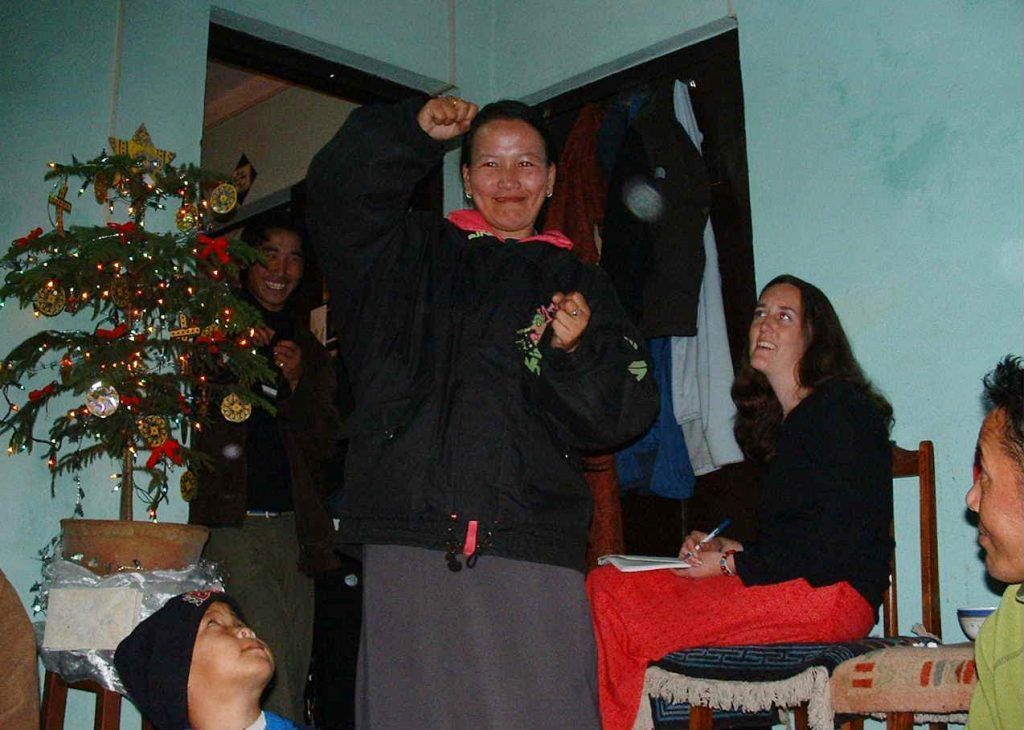I love Christmas. My mama always called me her “Christmas girl.”
When I was growing up there was nothing like waking up at Grandma’s house on Christmas morning. The Christmas tree twinkling in the early morning hours, holiday smells wafting from the kitchen, stockings filled with treasures. Listening to my dad read the Christmas story from the Bible and thinking about Mary giving birth in the stable to Baby Jesus warmed every inch of my soul. Even crawling half asleep into a freezing cold car to go home felt like a magical part of the whole experience to me.
Yes, my mama was right. I am definitely a Christmas girl.
I’ve spent seven Christmases on the other side of the world. For the most part, they were beautifully simple, meaningful days mixed in with a whole lot of loneliness.
And I guess that’s the first thing to get out of the way when we’re talking about Christmas on the mission field.
It’s lonely.
Loneliness is an issue most missionaries face almost daily. But on Christmas, it just hurts more. And, to be totally honest, it’s just part of the deal. When we left family and friends, comforts, and our favorite snacks, Christmas — as we knew it — was gone forever, too.
Most missionaries wouldn’t trade it. In our minds and deep down in our hearts, we know that. We’re compelled by His love to be exactly where we are. And we want to be. I mean, we get to celebrate the incarnation of Christ every single day by speaking the good news of a baby born to change everything. How’s that for year-round Christmas joy?
But that doesn’t mean we don’t have moments when we yearn to be surrounded by buttery Christmas cookies and crackling fires and hot chocolate.
When I was overseas, I missed everything. I missed the lights, the music, even the feeling you get when you walk into church for the Christmas service with everyone dressed in red and smiling, while someone is playing familiar carols on the piano.
The traditions we left behind, no matter how non-essential, are genuine losses as well. Just like giving up indoor heat or your heart language or your mom and dad.
It’s a real sacrifice. It’s a genuine cost.
So, missionary, take it as a loss. Accept it. And then embrace it.
My first four Christmases overseas were spent as a single person. An extrovert at heart, being alone was not going to cut it. Without family nearby, I had to get me some fill-ins. (Just kidding. But not really.)
I invited neighbors and friends and anyone around to come for Christmas brunch and Christmas games and the Christmas story. It was a reminder and a picture of Christ calling all from the highways and byways to His feast.

Inviting friends and neighbors to celebrate Christmas with me brought new joy to old traditions. Photo courtesy of Deb Wyss
I got to share some of my favorite traditions and watch friends’ joy unfold as they discovered for the first time the things I had loved for so long: neighbors trying to unwrap presents while wearing bulky mittens. Howling with laughter as a teacher tried to act out “yak” in a game of charades. Watching guests spend over an hour decorating the perfect Christmas cookie. Experiencing old traditions in new ways brought a different kind of joy.
The forced simplicity of Christmas overseas made everything that much more meaningful for me. I will always remember the years of worshiping Jesus together on Christmas with just a handful of people, who represented multiple countries. What a foretaste of glory divine!
Making new traditions became a special and helpful way for me to bring new joy and significance to the holiday season. Here are a few ideas for you:
1. Get yourself your very own “Charlie Brown Christmas tree.”
One year, it was as simple as a plant from the local market for us. I began to add my own homemade ornaments year after year to commemorate special events that happened during the year. This was pure bliss to my sentimental core and satisfied my constant desire to record and analyze the happenings of my journey.

My Charlie Brown Christmas tree. Photo courtesy of Deb Wyss
It was a reflective and praise-giving activity to thank God for His sovereignty in it all. By the way, I am not crafty. I cut out photographs, made holes with pens and tied thread to each one.
2. Make a Christmas countdown paper chain.
I made mine with a different name for Christ quoted in the Bible for each day of Advent.
3. Make new food traditions.
Not having the traditional Christmas foods can be a big let down. We started new traditions in the area of food.
We had a Christmas Eve “snack meal” by making fun, special foods that are familiar but could be made from local ingredients. We made meatballs and homemade “nachos” and splurged on dried fruits and nuts we didn’t normally have during the year.
4. Make giving presents into something a bit different.
Set a very small dollar amount with your family or other foreign friends, and see how far you can stretch it. One of my favorite presents from my husband was a roasted duck and grapes.
5. Have a special activity you reserve for the holiday season.
For us, we put together a jigsaw puzzle each Christmas. This took some forethought, as I purchased a few of them when we were on home assignments to have them ready for Christmas.
6. Do something out of the ordinary.
We chose to blast the heaters. After being so cold for so long, we chose to ignore the cultural norms and the bill and be warm!
7. Celebrate the “family” God provides for you overseas.
Gather together and just be. Play games, laugh, talk about your family traditions at home. Celebrate God’s wisdom in having you born in the exact place He preordained, just as He sent Jesus to be born in a manger.
Wishing you joy in Christ during this Christmas season!




















